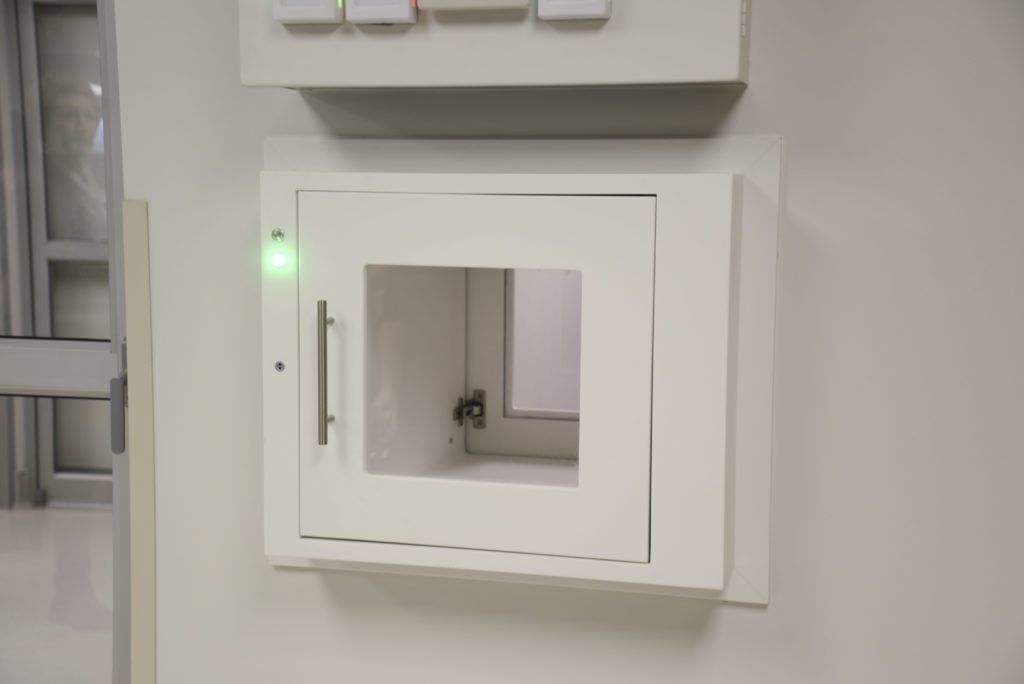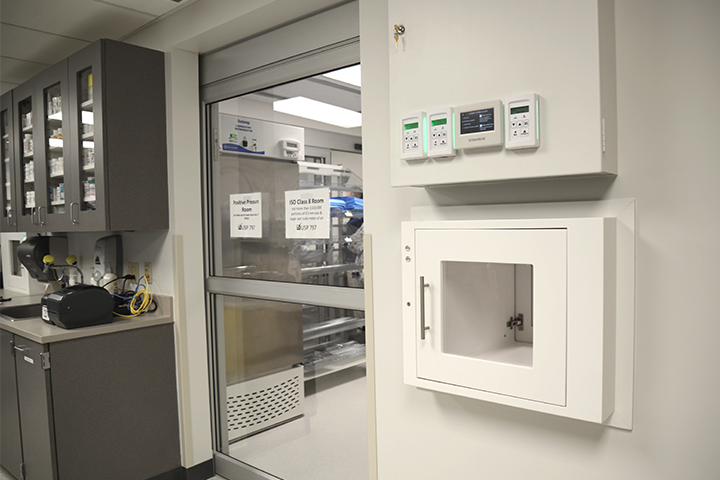New cleanroom pass-throughs at The University of Kansas Health System
The University of Kansas Health System worked with Pulse Design Group, Kelly Construction and Shield Casework to renovate cleanrooms within four of the health system’s cancer sites. These cleanrooms are where patient drugs are prepared. They require special care and attention to help ensure the safety of staff, who are at risk of coming in contact with hazardous drugs during the compounding process, and to help prevent contamination of the prepared drugs which can be harmful to patients.
Cleanroom USP compliance
The cleanrooms needed to become compliant with two new pharmacy standards established by the United States Pharmacopeia (USP): USP 797, which focuses on sterile compounding preparations; and USP 800, which focuses on the safe handling of hazardous drugs. Adherence to these standards are evaluated by The Joint Commission (TJC) during reviews to ensure that health care facilities make the process of handling and distributing drugs safer for patients and staff alike.
New hepa-filtered air handling systems and equipment were added to help remove particles and contaminants from the air, and to help regulate changes in temperatures for specific rooms. However, both the architect and the pharmacists were looking for an alternative solution to expensive stainless steel pass-through cabinets that have been the industry standard since the beginning of time.
Pass-through cabinets
Pass-throughs are essentially a window built into an interior wall. For pharmacies, their primary purpose is to facilitate the safe transfer of drugs and supplies into and out of rooms while maintaining the appropriate pressurization of the rooms on either side of the window. Pass-through cabinets also help reduce the amount of foot traffic into and out of the cleanroom, which can help prevent potentially harmful particles from entering.
The new solution

Shield Casework collaborated with the design team and clinicians to create the first ever solid surface pass-through cabinet in accordance with USP standards. The University of Kansas achieved their compliance goals of making the rooms safer for patients and staff while reducing overall cost. Moreover, health systems now have an alternative to traditional stainless steel pass-through cabinets made from a material that’s already a design standard countertop material in health care facilities across the nation – solid surface.
Learn more about the benefits of solid surface and why Shield specializes in building healthcare products with it in this blog post.[vc_separator type=”transparent” up=”20″ down=”20″]
Key benefits
- Improved staff and patient safety: USP 797 and USP 800 compliant for TJC surveys
- Lasting durability: Shield’s signature 100-percent solid surface cabinet with patented embedded stainless-to-stainless steel connections is protected by a lifetime warranty.
- Cleanability and stain resistance: Solid surface is a microbial-, fungal-, and bacteria-resistant material that’s bleach cleanable and stain-resistant.
- Room pressurization control: Shatterproof Lexan doors enclosed with gasket seal to prevent leakage. Automatic magnetic interlocking mechanism prevents both doors from being opened simultaneously.
- Improved clinical workflow: indicator lights help clinicians save time and steps by displaying the open/close status of the opposite side, and indicating that an item is in the pass-through and ready to be removed.
 [vc_separator type=”transparent” up=”20″ down=”20″]
[vc_separator type=”transparent” up=”20″ down=”20″]
Virtual Tour
Take a virtual tour of the cleanrooms at The University of Kansas to learn about other new safety features.
[vc_video link=’https://www.youtube.com/watch?v=E0m5TpsecGI’]
[vc_separator type=”transparent” up=”20″ down=”20″]





Sorry, the comment form is closed at this time.